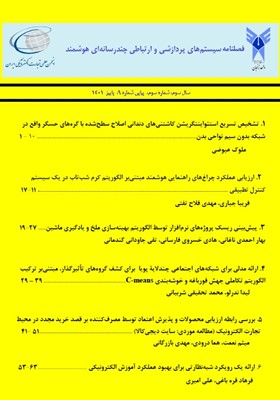بررسی رابطه ارزیابی محصولات و پذیرش اعتماد توسط مصرف کننده بر قصد خرید مجدد در محیط تجارت الکترونیک (مطالعه موردی: سایت دیجی کالا)
محورهای موضوعی : پردازش چند رسانه ای، سیستمهای ارتباطی، سیستمهای هوشمند
میثم نعمت
1
,
هما درودی
2
*
![]() ,
مهدی بازرگانی
3
,
مهدی بازرگانی
3
1 - کارشناسی ارشد، گروه مدیریت، واحد زنجان، دانشگاه آزاد اسلامی، زنجان، ایران
2 - دانشیار، گروه مدیریت، واحد زنجان، دانشگاه آزاد اسلامی، زنجان، ایران
3 - استادیار، گروه کامپیوتر، دانشکده برق و کامپیوتر، واحد زنجان، دانشگاه آزاد اسلامی، زنجان، ایران
کلید واژه: ریسک درک شده, اعتماد آنلاین, سودمندی درک شده,
چکیده مقاله :
در این پژوهش به بررسی رابطه ارزیابی محصولات و پذیرش اعتماد توسط مصرف کننده بر قصد خرید مجدد در محیط تجارت الکترونیک (مطالعه موردی: سایت دیجی کالا) پرداخته ایم. روش این پژوهش، بر حسب نوع هدف، کاربردی و برحسب روش توصیفی- تحلیلی به شیوه پیمایشی است. ابزار گردآوری اطلاعات پرسشنامه محقق ساخته بود. جامعه آماری در این پژوهش کاربران سایت دیجی کالا بود و برای تعیین حجم نمونه از فرمول کوکران نامحدود استفاده شده است که براساس محاسبه 384 پرسشنامه توزیع و جمعآوری گردید. برای تجزیه و تحلیل دادهها از نرم افزار لیزرل استفاده شده است. نتایج پژوهش نشان داد که، ریسک درکشده بر اعتماد آنلاین و قصد خرید مجدد تأثیر منفی و معناداری میگذارد. اعتمادآنلاین بر سودمندی درکشده و قصد خرید مجدد و سودمندی درک شده بر قصد خرید مجدد، شهرت وبسایت بر کیفیت درک شده، ارزش درکشده و اعتماد آنلاین تأثیر مثبت و معناداری میگذارد. قیمت رقابتی درکشده بر کیفیت درکشده تأثیر منفی و معناداری و بر ارزش درکشده تأثیر مثبت و معناداری میگذارد.
Introduction: With the ever-increasing spread of information and communication technologies, the world is witnessing a great transformation, which is referred to as the information age. Technology-based services such as e-commerce using remote communication systems and information technology can give rise to significant benefits such as increased profitability. E-commerce has transformed the economy and society and brought many benefits to organizations, customers, and society. Analyzing purchase intention followed by purchase behavior by the consumer can save money and increase productivity in an organization. Among the factors that significantly affect purchase intention are consumer evaluation of products (perceived value, perceived product quality, and competitive price) and trust (perceived risk, perceived usefulness online credibility, and website reputation). Considering that the expectations of customers are constantly increasing, organizations are required to go beyond satisfying the primary needs of consumers and focus their attention on creating satisfaction, long-term bilateral and profitable relationships. Online shoppers are likely to view price as an important cost component and compare prices between different options. With the intensification of competition in business and rapid technological changes, as well as the increase in the power and right of consumers to choose, the success will belong to those companies that are able to understand and identify the expectations and desired values of customers in a more appropriate way and respond to them in a favorable way. This research examines the factors affecting the increase in purchases in e-commerce.Method: The current research is applied in terms of purpose because the results of the current research can be used by e-commerce managers in Iran in order to improve their strategies. In this research, the statistical population is the users who buy from the Digikala website in Iran, which the researcher does not have an accurate statistic of the number of statistical samples available, so it is considered an unlimited population. A statistical sample will be used among users as an available (non-probability) sampling method.Findings: Perceived risk has a significant effect on online trust and purchase intention. Furthermore, online trust has a significant effect on perceived usefulness. Online trust and perceived usefulness have a significant effect on purchase intention. The credibility of the website has a significant effect on the quality of the products and on online trust and on perceived value. Perceived competitive price has a negative and significant effect on product quality. The perceived competitive price has a significant effect on the listed value.
_||_

